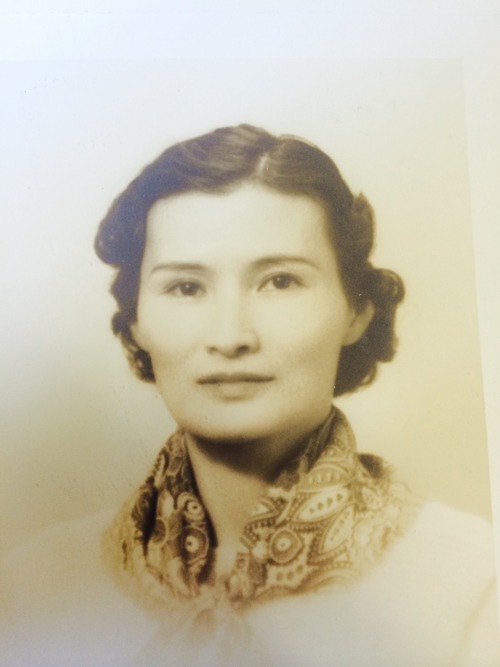By Elaine H. Kim

This photo of the author’s mom was taken in 1937, when she was about 35 years old.
I am over 70 years old. My mother has been gone for almost 25 years, and I am still immature enough to have not totally forgiven her, despite what I know about her social and historical context and despite all my attempts to be a good feminist.
My mother remains mystery to me. When she died in 1989, we weren’t able to fill out the death certificate properly because no one, not even my father, knew her real name, birth date, or when she entered the U.S. Although we had many nice photographs of my father, for my mother we had to use a fuzzy image, cropped and blown up from her 1930s graduation photo.
Because my mother had my brother and me later in life, she was old enough to be my grandmother. In her early 60s she began showing signs of Alzheimer’s Disease, and by the time I was an adult and wanting to learn as much as possible about her life and history, she had already forgotten almost everything.
Sensing my eager interest, my mother tried to conjure up the few stories she had left. One she repeated often was about her stepfather, a tenant farmer on the Pacific Coast. He would promise some of the many aging bachelors of the time that they could have her when she came of age if they would work on his farm for free. She said she would watch with sick horror as they knelt among the rows of vegetables, pulling weeds with their gnarled hands.
Before she lost her memory, my mother used to repeat another story. To escape a beating by her stepfather, she would lock herself in the outhouse and spend many hours reading, over and over, every word on the English language newspapers plastered on the walls and ceiling.
The third story was about a date at a movie theater with a Japanese American boy. Her stepfather was so angry that he took to his bed and refused to eat for a week. She wasn’t interested in the boy anyway, she recalled, because his habitual sniffling irritated her.
Nothing she said about her stepfather revealed affection on her part or his.
About her mother she said little. I never met my grandmother. There is only one black and white snapshot of her. Taken from some distance, it shows in her in a plain white hanbok, her hair parted in the middle and slicked back into a bun in the way of all married Korean women in her time. She appears very dark. The sun might have been directly overhead, shadowing her face, so there is no clue about whether her expression may have been kind or intelligent or warm.
Before she lost her memory, my mother told and retold three stories involving her mother. In the first story, she remembers standing on a box at a basin in an orphanage, playing with water. She said that her mother had a hard time reclaiming her. I imagine that in the U.S. near the beginning of the 20tht century, many poor single women who had to earn a living had little recourse but to place their children in orphanages There was no public childcare, and perhaps it might have been harder to get your child back once you’d surrendered her. My grandmother couldn’t speak, read, or write in English, so she may have also signed her child over without understanding the rules.
In the second story, my grandmother punished my mother severely for stealing a pear when she was six or seven years old. I felt that my mother told that story to discourage us from stealing and to make our grandmother seem to us like a good mother.
In the last story, my mother revealed that she could not confide things having to do with sexuality to her mother. Terrified at the sight of blood with the onset of menstruation, she hid the traces in the bushes. And when a man who was lying in wait for her as she passed by on her way to school lunged at her and tried to pull down her bloomers, she never dreamed of seeking her mother’s support. “Oh, no, I could never tell my mother! I just had to take the long route to school after that,” she said, as if that were the only logical thing to do.
When I strain to think about whether or not there was affection between my mother and my grandmother, I conclude that there might have been, although I cannot be sure.
When I was nine years old, a molester came to live with us and stayed until I was 17 and left for college. In those days, our two-bedroom house was filled with people from Korea: refugees, diplomats, business people passing through, and some people working or studying temporarily in the U.S.
I felt both attracted to and repulsed by the molester. Mostly I felt responsible for what he was doing. I never felt that my mother would or could protect me, either from my brother’s violent bullying or from the molester lurking inside our very house. When I tried to say something once, she interrupted irritably, “I hate tattle-tales and crybabies.”
It wasn’t until a neighborhood white girl told my mother that the molester had trapped her on the stairway and tried to push his hand under her blouse that she tried to make sure nothing like that happened again.
After I grew up and was living far from home, I came to resent my mother. As someone who had been molested and beaten herself, she should have protected me. I concluded that she cared more about what white people thought than about me and thought that boys were worthy and girls were not.
Lack of maternal support and guidance, I thought, made the effects of race discrimination and bad experiences with boys more powerful.
But just like my mother, I hate tattle-tales and crybabies. I think America values resilience and detests whining and complaining. “Get over it!” “That’s history!” “Move on!” “Quit whining!” “Don’t take yourself so seriously!”
I tried to remember that some girls didn’t even have mothers, and that other girls had domineering mothers with soul-crushing expectations that render their daughters fearful of failure and unable to enjoy their own accomplishments.
I try to consider my mother’s circumstances, growing up a poor racialized female immigrant at the height of white supremacism and when patriarchal attitudes and practices, both American and Korean, flourished unquestioned and unabated. It’s likely that she did not receive much loving support herself, but still she emerged as someone who tried her best, based on what she knew and understood.
On the other hand, I know from studying history that trying to pave over the past and move on is not a good thing. Unless we admit and reckon with it, the past keep bubbling up to haunt us.
At my age, I can no longer blame my mother’s mothering for anything that I have become. But it’s still not easy to forgive her for losing her memory and with it her views of herself, her experiences and their meanings, which may, for good reasons, be very different from mine.
Elaine H. Kim teaches Asian American Studies at UC Berkeley. She is a co-founder of Asian Women United.
